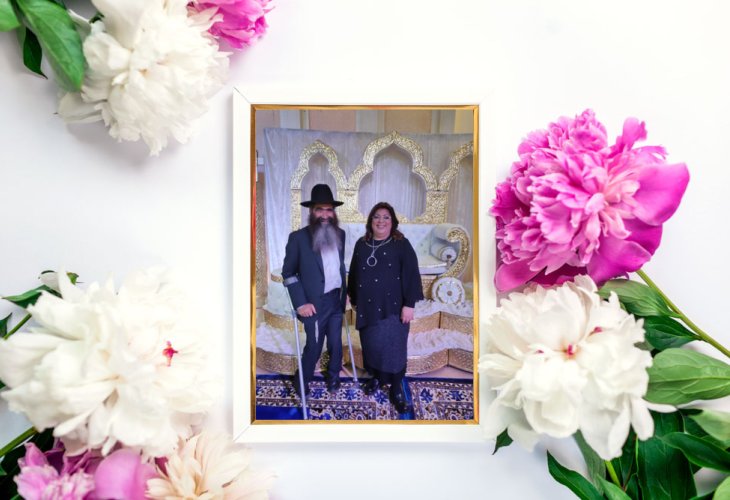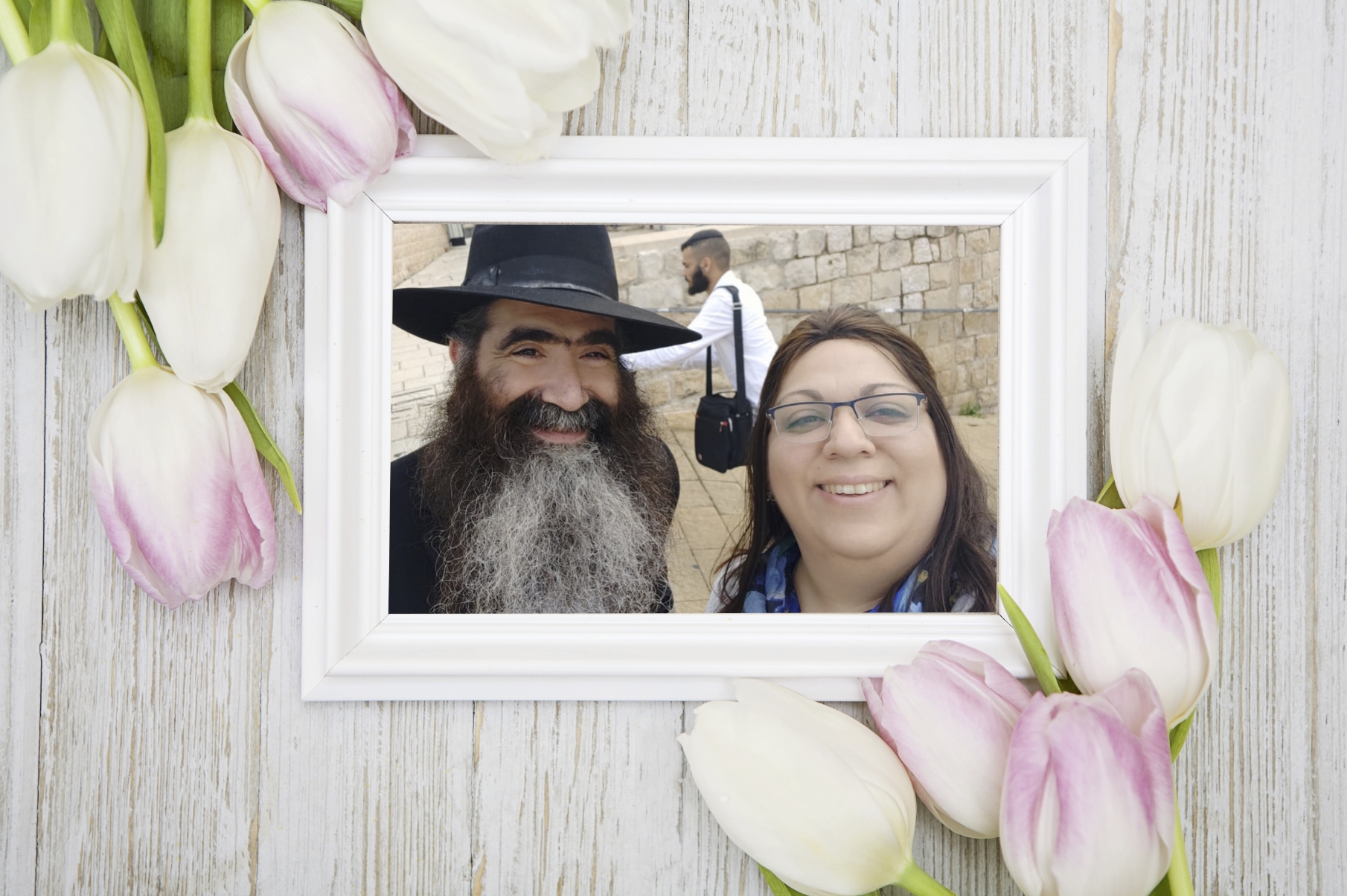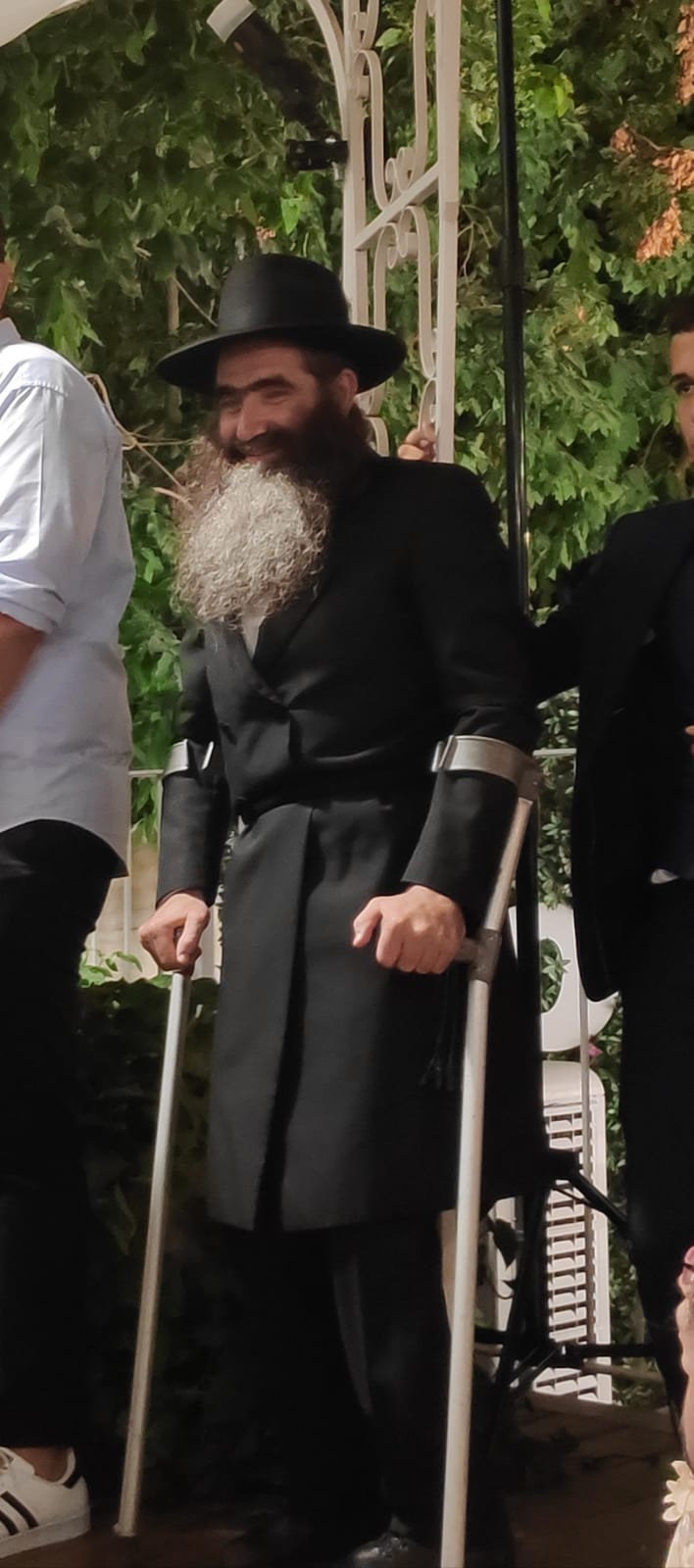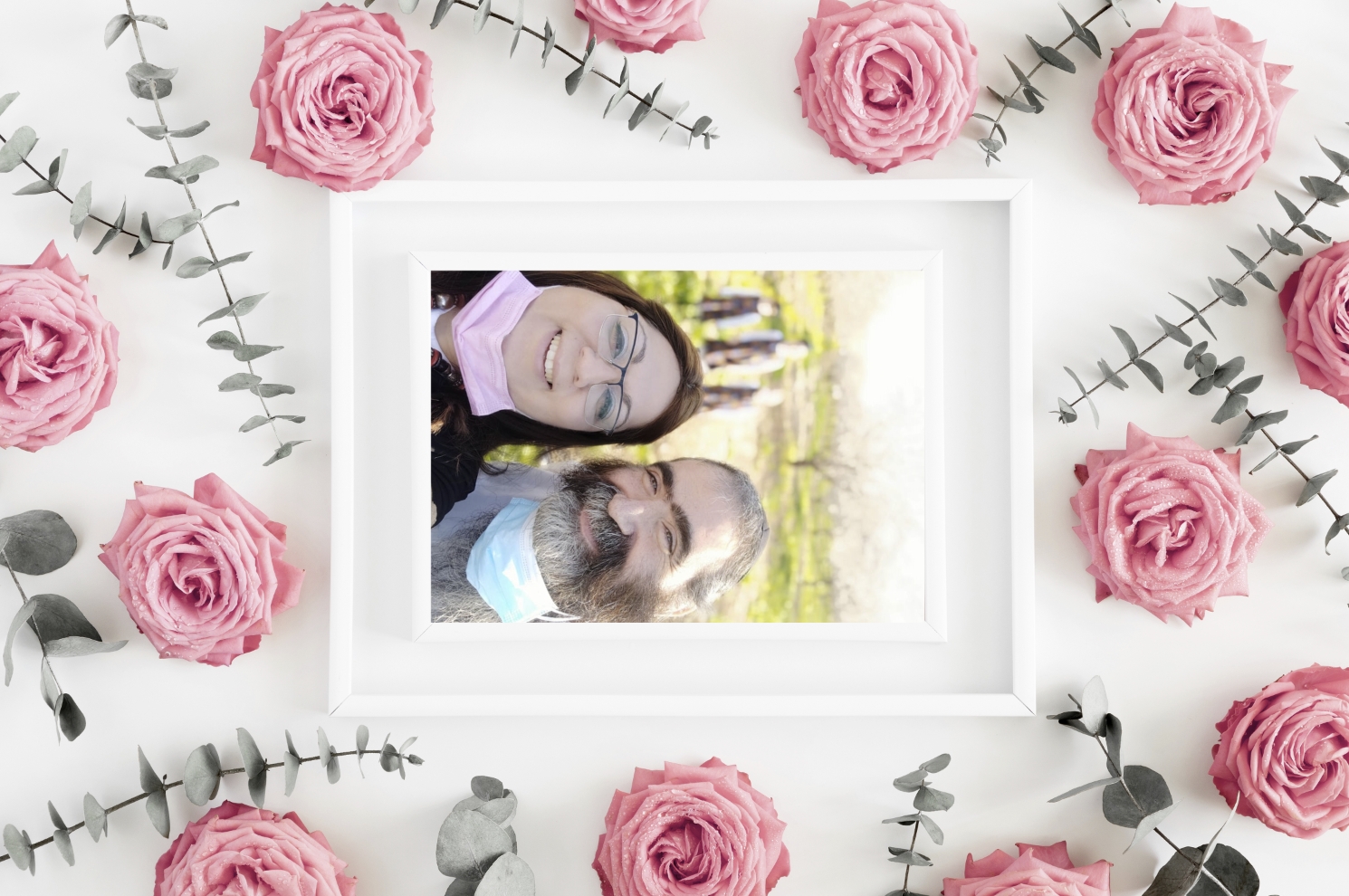"Our Daughters Sometimes Forget They're Adopted, and So Do We"
Ofer and Oshrit Gobi adopted three daughters and feel it's a true blessing. How does Ofer's disability impact parenting? An inspiring interview.
 Ofer and Oshrit
Ofer and Oshrit"It will be hard to talk today, my daughters are home, and you know what children's noise is like..." When Oshrit Gobi tells me this, she sounds like any busy mother juggling between work, taking care of her children, and other household tasks.
Only when we finally find time to talk do I learn from her that just a few years ago, her life looked completely different when she could only dream of hearing sounds of excitement and laughter echoing through the house. Oshrit and Ofer waited for over a decade to have children of their own and faced numerous challenges along the way until the moment they adopted three daughters, biological sisters, transforming them into a family. And not just any family, but a cohesive and happy one.
"We live in Mevo Horon," Oshrit notes, "and I don't think there's anyone in our community who isn't aware that the daughters we're raising aren't our biological children. We've never tried to hide it, and the girls have known since they were young. But people meeting us for the first time are always surprised. It's hard for them to believe that the girls, who have become such an integral part of our lives and are so attached to us, aren't our biological daughters."

Work, Home, and Everything In-Between
Oshrit is well-known both in her community and outside it, perhaps because of her interesting occupation. "I work under two hats," she explains, "First, I'm a graphic designer, building websites and performing tasks in that field. Secondly, I engage in the spiritual realm — as a mikveh attendant and instructor for brides and married women. I feel it's a tremendous mission to work in matters related to purity."
In fact, she has been involved in this for nearly 20 years. "I started on the instruction of the Lubavitcher Rebbe, who specifically directed me to this field. To this day, I continue to see his blessing accompany me at every step. Over time, I became aware of the great thirst among married women who want to learn and review the laws. For this purpose, I established numerous study groups on the subjects of purity, perspective, and strengthening the Jewish home. I strive to always be available to answer all kinds of questions. Of course, when I don't know the answers, I refer them to rabbis as needed. There are also those who come to study privately."
Oshrit works around the clock. "I only sleep during the small hours of the night and wake up early to start a new day. Even during the hours I sleep, women know they can wake me if there are urgent matters because I strive to answer at any time. I know how important a response can be, and sometimes it's needed especially at unusual hours. This is my mission, and I dedicate myself completely to it."
But it doesn't stop there, because in addition to the usual responsibilities Oshrit has as a mother, wife, and woman with two jobs, she manages more things at home than a standard woman, since her husband, Ofer, was born with CP and has limited walking ability.
When discussing it with Oshrit, it's a bit hard for her to see it as a big deal. "Ever since Ofer was a small child, he was raised to be as normal as possible," she explains. "His parents sent him to mainstream frameworks and didn't make any concessions. He even joined trips and always tried to be like everyone else."
Oshrit mentions that before their wedding when she was presented with the match proposal, she wasn't deterred or thought for a moment that her husband's walking difficulties and reliance on crutches should deter her. "The ones who suggested our match were mutual friends—my friend and Ofer's friend. They explained why they thought it would suit, and so I decided to focus less on the exterior and more on the interior."
No Challenge Felt
Soon after their initial acquaintance, Oshrit and Ofer were certain about building their home together. "My parents were initially a bit anxious," Oshrit admits, "In their eyes, they saw no reason their 'normal' and healthy daughter should involve herself in such a situation. But after knowing Ofer, they didn't think twice and welcomed him with open arms and great love. From the beginning, I wasn't concerned at all. I was drawn to his inner self, which interested me much more than his manner of walking."
How does your husband's limitation affect your daily life?
"In practice, I'm the one who manages the household, so most things fall on my shoulders. For instance, I'm the one who replaces a bulb if it burns out. I also drive screws, fix cabinets, and carry heavy appliances. But I believe I'm not the only one; there are other women in the world who do these things themselves. I think Hashem also prepared me for this in advance because I come from a family of daughters, and my father, who is a technical man, always taught me how to do all these things independently, so I came with a lot of background."

Still, Oshrit emphasizes that her husband does quite a few things around the house. "I don't let him off," she smiles, "He has regular duties, and he fulfills them excellently. For example, he washes the dishes and even takes out the garbage. He has a special cart where he places the bag, and that’s how he brings it to the trash can. I think his amazing ability to do everything is thanks to his parents, who didn't let him off anything as a child. Thanks to them, he currently does many things. My husband also works and earns, although I must say that at the beginning, he found it hard to find a job due to the impairment. Unfortunately, certain difficulties still exist in the public regarding including people with disabilities, even when the disability doesn't affect their life at all."
What is his occupation?
"He initially sought work as a teacher, but as I mentioned, doors closed in his face. Ultimately, it turned out for the best, as he advanced in Torah studies as a yeshiva student for 18 years. Two and a half years ago, he began working in a yeshiva as an assistant in a special education class. Baruch Hashem, he is very successful in his work and sees great blessings in his efforts."
Like Regular Parents
Oshrit shares that even before her wedding, she always had a dream to adopt children. "I always dreamed of giving to children without someone to raise them. I never imagined it would come to me from this direction after we unfortunately didn’t have children of our own, and by the way, this is completely unrelated to my husband's limitation."
Exactly ten years ago, they received their first daughter, two years later, her sister joined, and two more years later, the third sister arrived. "When siblings need adoption, it's common for the court to check if the family that received the first child can also take in the other siblings, as the ideal situation is for them to grow up together," she explains. "When the girls joined our family, there was great excitement, not only in our private home but in the entire community. With every child that joined us, we felt as though we had won a substantial prize."
Since all three girls came at a very young age, they don't know any other life. "Our home is the only one they know, and we are their parents in every sense. We are also the ones who gave them their names."
 Parents Ofer and Oshrit, with the three adopted daughters behind
Parents Ofer and Oshrit, with the three adopted daughters behindAre the girls aware that they're adopted?
"Yes, today's approach is to tell children at a young age and be open with them. Each of our girls has an 'adoption book' where I've designed her story and detailed how she came into the world and what she went through since she was a baby, all accompanied by pictures. I notice that from time to time, they're curious, and they raise questions. We always talk about it in the most open way possible."
"But the truth is," Oshrit adds, "that my husband and I frequently almost forget about it. A few years ago, we had the opportunity to join a vacation for families who have adopted, with the aim being for the children to meet other children in the world growing up in a similar lifestyle. From time to time, we had to stop and remind ourselves why we're there because the girls are so much ours, and it's hard to remember they're adopted."
This type of upbringing surely brings challenges...
"Obviously, being parents is a never-ending job," Oshrit agrees, "but I don't think we're working more than parents of biological children."
Are there things you give up on as a family because of your husband's difficulties?
"Almost none. When the girls were little, Ofer developed his own methods to hold and care for them. At some point, each of them discovered his 'weakness', and they would run away from him and call out, 'Dad, you won't catch me...' It took them a while to realize their father is somewhat limited, but they don't feel it at all in their daily life. It doesn’t affect them in any way. We even go on family hikes together. Of course, it's challenging, but we try to find easy and accessible nature trails."
Fulfilling the Mission
"We are married exactly twenty years," Oshrit concludes, "and when I look in retrospect, I see clearly how Hashem designated for me a precise mission, written just for me. Hashem chose me to strengthen the subject of family purity, and the interesting thing is, he decided to challenge me exactly where I struggle. For it really wasn't easy at all for me to meet repeatedly with women who shared that they had children, while I was still waiting. It's impossible to say I didn’t feel a stab of jealousy. But from exactly that place, Hashem chose me so I could give of mine to others and spread even more."
Nowadays, she emphasizes she no longer feels that difficulty. "I know and feel that no one takes away what belongs to me, and encountering so much joy in the lives of others doesn't lessen anything for me, but on the contrary, empowers me, and I rejoice with each one. When women call me and tell me they are about to give birth and want to come for a segulah immersion, I'm so happy for them. It's one of the things that move me the most."
Oshrit pauses for a moment and adds after reflection, "The secret is to focus on the light, to constantly think about where I can make an impact, and how I can fulfill my mission in the world. Hashem doesn't owe us anything; we just need to find our purpose and fulfill it with joy."

